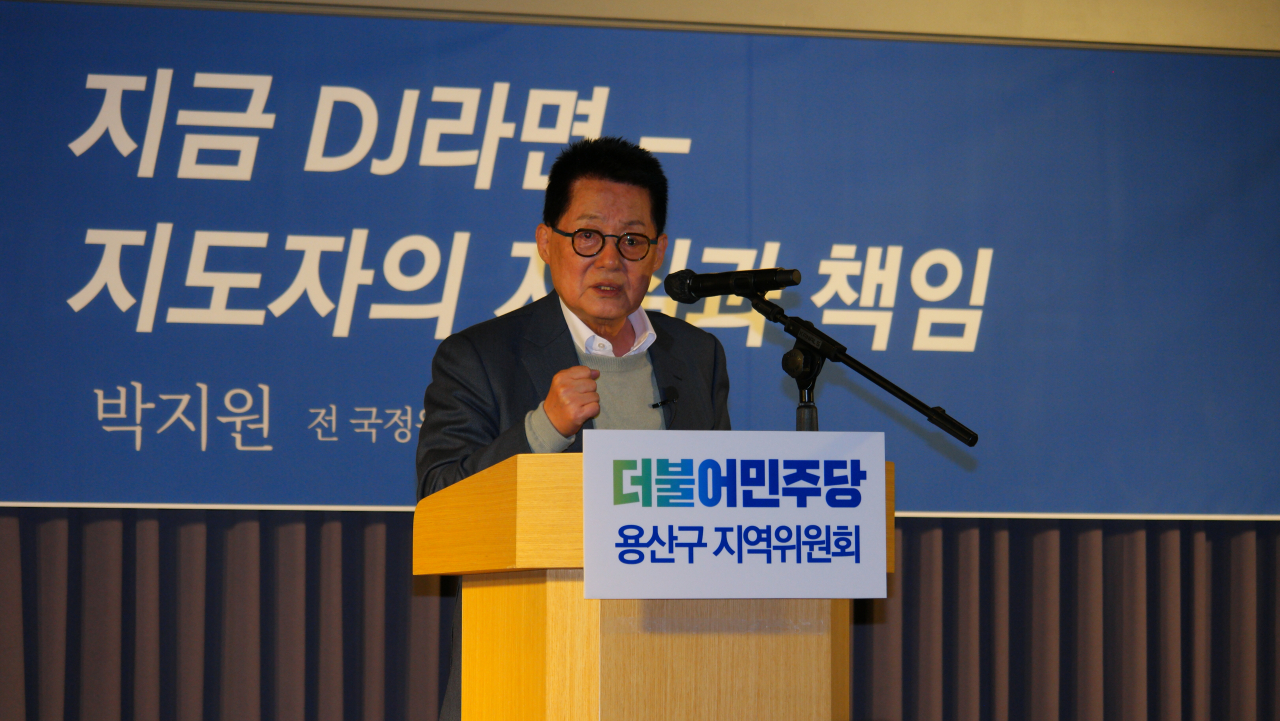Kim-Obuchi spirit missing from Tokyo summit: ex-spy chief
By Kim ArinPublished : March 19, 2023 - 17:07

South Korea and Japan agreeing to mend ties at the Tokyo summit on Thursday does not build on what is embodied in the Kim-Obuchi declaration in 1998, according to former President Kim Dae-jung’s longtime aide Park Jie-won.
Speaking to The Korea Herald on Saturday, Park said he “would not liken” the deal reached by South Korea and Japan in the recent summit to the declaration signed by South Korean President Kim Dae-jung and Japanese Prime Minister Keizo Obuchi.
Current South Korean President Yoon Suk Yeol, following the summit talks with his Japanese counterpart, Fumio Kishida, said that he would “inherit and build on the spirit of the Kim-Obuchi declaration.”
In that declaration, Kim and Obuchi agreed to “build a new Japan-Republic of Korea partnership toward the 21st century” and set out on a “future-oriented relationship.”
Similarly, Yoon has said he would approach the country’s relations with Japan in a “future-oriented” way.
Park made it clear he does not endorse the current administration’s references to the commitments outlined by the earlier declaration to highlight the outcomes of Thursday’s summit.
“I wouldn’t say that the summit builds on the legacy of the Kim-Obuchi declaration. I would rather they not say that,” he said.
Park, who was involved in the drafting of the 1998 declaration as a senior secretary to then-President Kim, said that in order for the two countries to move forward, justice must be served first for the South Korean victims of war crimes.
“The essence of the Kim-Obuchi declaration is in the apology and the recognition of the suffering caused to the Korean people in the past,” he said. “This is missing from what came out of the (Yoon-Kishida) summit.”
In the declaration, Obuchi expressed “deep remorse and heartfelt apology” over colonial grievances, which Kim “accepted with sincerity.”
In November 2020, Park, who was then head of the National Intelligence Service, was in Japan himself to discuss reparations for wartime victims with Japanese Prime Minister Yoshihide Suga. He returned with little to show.
“Japan does not seem to have changed much in terms of where it stands on the historical issues,” he said.
On Yoon’s plan to compensate victims of Japan's forced labor using local funds, he said that Japanese companies should participate in the funding.
“Japan appears to be willing to improve relations with Korea. Without apology and reparations, however, there is no future.”
Park, in a lecture at the Democratic Party of Korea committee in Seoul’s central Yongsan on Saturday, said that now it was “Japan’s turn to reciprocate Korea’s offer of an olive branch.”
“President Yoon made offers to resolve the forced labor feud this time. Then I don’t think we should expect Prime Minister Kishida to come to Korea empty-handed when he returns the visit,” he said.
He said that he believes Korea and Japan must reconcile in the end.
“I may take heat from the Democratic Party for saying this, but the two countries have got to get along. I say this as the son of an independence activist,” he said.
“Our relations must be restored. Some compromises may be inevitable. But they shouldn’t come at the expense of the victims.”
The Democratic Party has called Yoon’s summit with Kishida a “humiliating diplomatic defeat,” with dozens of its lawmakers participating in anti-Yoon rallies led by left-leaning civic groups over the weekend.
At one of the rallies on Saturday, Democratic Party Chair Rep. Lee Jae-myung said the Yoon administration has “finally chosen the path to be Japan’s puppet.”
“Our president turned a blind eye to the cries of the victims and hurt the Korean people’s pride,” he said, referring in particular to Yoon’s forced labor compensation plan.
The Democratic Party has announced a series of actions decrying the Yoon-Kishida summit over the course of next week.








![[KH Explains] How should Korea adjust its trade defenses against Chinese EVs?](http://res.heraldm.com/phpwas/restmb_idxmake.php?idx=644&simg=/content/image/2024/04/15/20240415050562_0.jpg&u=20240415144419)











![[Today’s K-pop] Stray Kids to return soon: report](http://res.heraldm.com/phpwas/restmb_idxmake.php?idx=642&simg=/content/image/2024/04/16/20240416050713_0.jpg&u=)